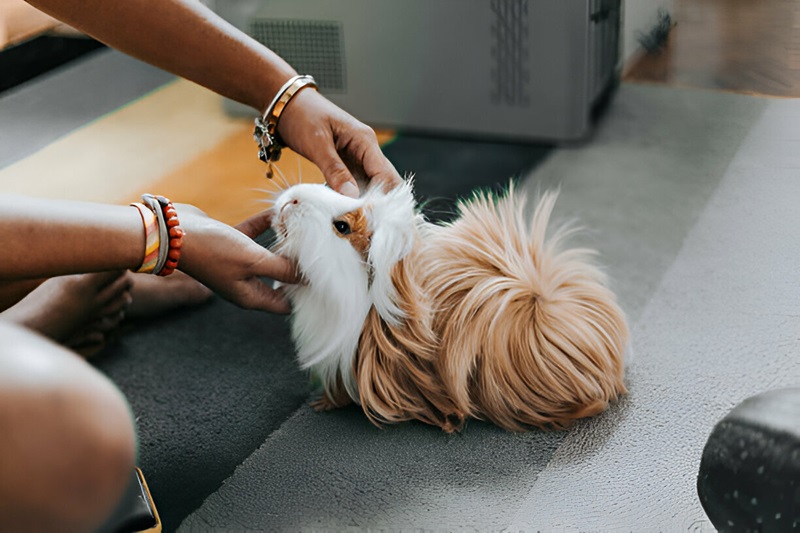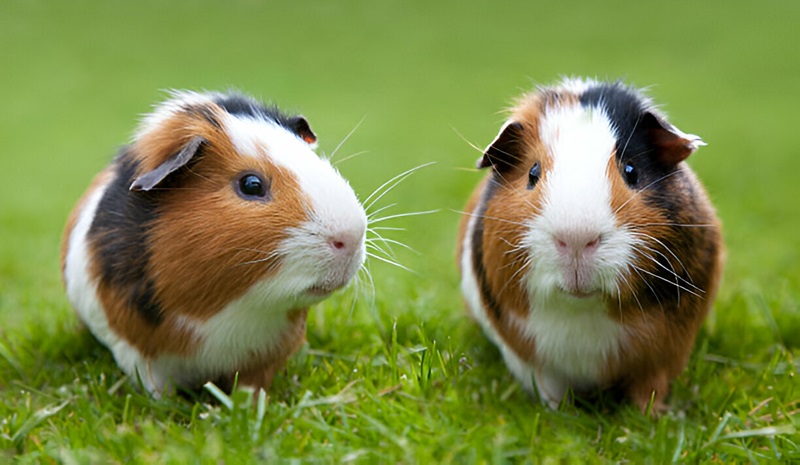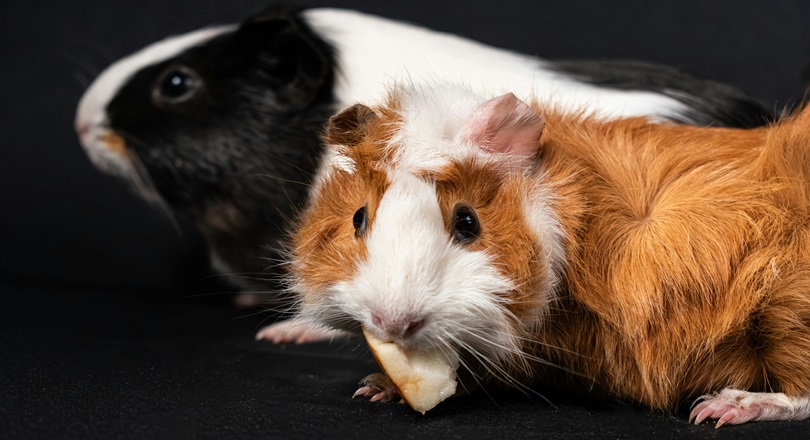Last Updated on February 28, 2025
Guinea pigs are friendly, social rodents that thrive in groups. They are gentle and rarely bite, making them great pets.
Guinea pigs, also known as cavies, are small, herbivorous rodents from the Andes in South America. They are popular pets due to their docile nature and easy care requirements. These animals have a lifespan of around 4-8 years and come in various breeds, each with unique coat types and colors.
Guinea pigs communicate through a range of vocalizations and body language. They require a spacious cage, balanced hay, vegetables, pellets, and regular social interaction. Proper care ensures they remain healthy, happy, and active, making them delightful companions for families and individuals.

The Social Dynamics Of Guinea Pigs
Guinea pigs are fascinating creatures with rich social lives. They thrive on interaction and develop unique social dynamics within their groups. Understanding these dynamics can help you ensure their well-being and happiness.
Bonding Behaviors
Guinea pigs show a variety of bonding behaviors that strengthen their relationships. They groom each other to build trust. This grooming is a sign of affection. Guinea pigs also engage in nose touching. This is their way of greeting each other.
Another common behavior is popcorning. When happy, they jump up and down. This is a sign of joy and excitement. Guinea pigs also communicate through whistling and purring. These sounds indicate their emotions and help in bonding.
Hierarchy In Groups
Guinea pigs establish a clear hierarchy in groups. This hierarchy helps maintain order and reduce conflicts. The top guinea pig often gets the best sleeping spots and first access to food.
To determine the hierarchy, guinea pigs may engage in rumble strutting. This involves a low purring sound and swaying movements. They also show dominance through mounting. These actions help establish the leader without physical fights.
Understanding these behaviors can help create a peaceful environment for your guinea pigs. Proper space, resources, and attention ensure each guinea pig feels secure and happy.
Communication Keys
Understanding the communication keys of guinea pigs helps you bond better. These furry friends use sounds and body language to express feelings. Knowing these signals ensures your guinea pig is happy and healthy.
Sounds And What They Mean
Guinea pigs are vocal creatures. Each sound has a meaning.
| Sound | Meaning |
|---|---|
| Wheeking | Hunger or excitement |
| Purring | Contentment or annoyance |
| Chutting | Happiness |
| Whining | Discomfort |
Wheeking is a high-pitched squeal. It often signals hunger or excitement, especially at feeding time. A low purring sound can mean contentment if relaxed or annoyance if tense. Chutting is a happy, chirping sound. It usually happens when exploring or playing. A whining sound indicates discomfort or displeasure.
Body Language Cues
Guinea pigs also communicate through body language. Key cues to watch for include:
- Popcorning: Jumping in the air, showing extreme happiness.
- Freezing: Staying still, indicating fear or alertness.
- Chasing: Playfulness or asserting dominance.
- Teeth chattering: Warning sign of annoyance or aggression.
Popcorning is a delightful sight. Guinea pigs jump in the air, showing extreme joy. If your guinea pig suddenly freezes, it may feel scared or alert. Chasing other guinea pigs is a sign of playfulness or trying to assert dominance. Teeth chattering is a clear warning. It signals annoyance or potential aggression.
Playtime Essentials
Guinea pigs are active, curious creatures that need regular playtime. Engaging them with toys and a stimulating environment ensures they stay happy and healthy. Let’s dive into some essentials for making their playtime fun and exciting.
Favorite Toys
Guinea pigs love to explore and play with different toys. Here are some of their favorites:
- Chew Toys: Wooden blocks, hay balls, and cardboard tubes.
- Hideaways: Tunnels, igloos, and small huts.
- Exercise Toys: Small balls and wheels.
Chew toys help keep their teeth healthy. Hideaways provide them a sense of security. Exercise toys keep them active and fit.
Creating A Stimulating Environment
A stimulating environment is crucial for a guinea pig’s mental health. Here are some tips to create one:
- Variety of Toys: Rotate toys to keep things interesting.
- Interactive Play: Spend time playing with your guinea pig.
- Safe Space: Ensure the play area is safe and secure.
Changing toys regularly prevents boredom. Interactive play strengthens your bond with your pet. A safe space ensures they can explore without getting hurt.
| Essential | Description |
|---|---|
| Chew Toys | Prevent overgrown teeth |
| Hideaways | Provide security |
| Exercise Toys | Keep them active |
Providing these essentials ensures your guinea pig has a happy and engaging playtime.

Diet And Nutrition
Understanding the diet and nutrition of guinea pigs is essential. These small pets need a balanced diet for a healthy life. Proper nutrition ensures they stay active and happy. Let’s dive into what they should and shouldn’t eat.
Foods They Love
Guinea pigs enjoy a variety of foods. Their diet should include:
- Hay: The main part of their diet. Timothy Hay is best.
- Fresh Vegetables: Carrots, bell peppers, and lettuce are favorites.
- Fruits: Apples, strawberries, and blueberries in small amounts.
- Pellets: Special guinea pig pellets provide essential nutrients.
| Food | Frequency |
|---|---|
| Hay | Daily |
| Fresh Vegetables | Daily |
| Fruits | Occasionally |
| Pellets | Daily |
Foods To Avoid
Some foods can be harmful to guinea pigs. Avoid the following:
- Chocolate: Toxic and can cause health issues.
- Avocado: Contains harmful substances.
- Dairy Products: Guinea pigs cannot digest lactose.
- Onions and Garlic: Can cause digestive problems.
- Iceberg Lettuce: Low nutritional value and can cause diarrhea.
By providing a balanced diet, you help your guinea pig thrive. Always ensure fresh water is available. Healthy foods make a happy pet.
Health And Happiness
Guinea pigs are delightful pets that bring joy to many households. Ensuring their health and happiness is crucial for their well-being. Proper care and attention will keep your guinea pig thriving.
Routine Care
Routine care is essential for a healthy guinea pig. Regularly check their food and water supplies. Fresh hay, vegetables, and clean water should always be available.
- Clean their cage weekly.
- Trim their nails monthly.
- Brush their fur to prevent mats.
Provide a spacious cage with safe bedding. Avoid cedar or pine shavings as they can harm your pet.
| Task | Frequency |
|---|---|
| Clean Cage | Weekly |
| Trim Nails | Monthly |
| Brush Fur | Weekly |
Signs Of A Content Guinea Pig
Happy guinea pigs show clear signs. Listen for soft purring sounds. This indicates they feel safe and content.
- They eat regularly.
- They explore their cage.
- They interact with you.
Look for bright eyes and smooth fur. These are signs of good health. A content guinea pig will also play with toys and enjoy cuddles.
Maintain their health and happiness with regular care. Your guinea pig will thank you with joyful behaviors.
Frequently Asked Questions
What Personality Do Guinea Pigs Have?
Guinea pigs have friendly, social, and curious personalities. They enjoy companionship and gentle handling. These pets are playful and vocal.
What Is A Guinea Pig’s Behavior?
Guinea pigs are social and curious animals. They enjoy exploring and need companionship. They often squeak to communicate.
Do Guinea Pigs Exist In The Wild?
Yes, guinea pigs exist in the wild. They are native to South America, primarily in regions like Peru and Bolivia.
What Are The General Characteristics Of Guinea Pig?
Guinea pigs are small, social rodents with a lifespan of 4-8 years. They weigh 1-3 pounds. They have a stocky body, short legs, and no tail. Guinea pigs are herbivores, eating hay, vegetables, and fruits. They communicate through various sounds and require regular grooming.
What Do Guinea Pigs Eat?
Guinea pigs eat hay, fresh vegetables, and guinea pig pellets. They need vitamin C-rich foods.
How Long Do Guinea Pigs Live?
Guinea pigs live between 5 to 7 years with proper care and a healthy diet.
Conclusion
Guinea pigs are fascinating, gentle pets that bring joy to many homes. Their friendly nature and easy care make them ideal companions. Understanding their behavior and needs ensures a happy, healthy pet. Embrace the charm of guinea pigs and enjoy their delightful company.
Discover the wonders of having these adorable creatures as part of your family.

